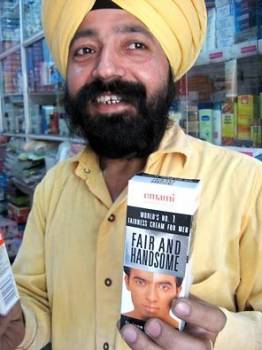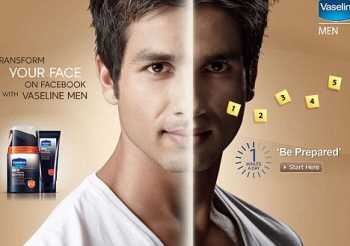Controversy seized the blogosphere in mid-July when Vaseline introduced a Facebook application to promote a line of skin-whitening products for males in India.
The “Transform Your Face on Facebook” tool allows Indian social networkers to digitally lighten their skin in photographs. If they like what they see, they can purchase the face cream that produces the same effect in real life.
“The response has been pretty phenomenal,” said campaign spokesperson Pankaj Parihar in an Adelaide Now report.
Skin-whitening is a major industry in India. Research agency Nielson estimated that it is worth $500 million and is growing rapidly. Originally, lightening products were designed exclusively for women, but in 2005, Indian company Emami introduced the popular “Fair and Handsome” skin cream for men. L’Oreal, Revlon, Garnier, and other foreign cosmetic companies quickly caught on to the trend.
According to Nielson, sales of men’s products increased by 25 percent last year, and women’s by 17 percent.
“It’s all lower-middle-class men who want the product now,” said Indian pharmacist Ajay Gupta in a Washington Post report last year. “What it really means is that the young and up-and-coming Indian male wants to look fair and therefore rich.”
In the past, higher castes in India were associated with fairer skin tones. The rich aimed to emulate their British colonial rulers. Last year, a Vaseline slogan promised the use of the company’s “Lightening Body Milk” would result in “an Aryan glow from head to toes.”
Bollywood stars are consistently fair-skinned—actor Shahid Kapoor was the face of Vaseline’s new campaign.
Skin tone is considered a make-or-break trait among many young Indians looking for romance. In a poll by the online dating site Shaadi last year, people from three Indian states chose skin tone as the most important characteristic in a partner.
Twenty-four-year-old Ashu Kumar told Agence France-Presse, “My skin is too dark. If I don’t make it fairer, I’m worried I’ll have trouble finding a woman to marry me.”
Critics of Vaseline’s facebook application have called it racist and oppressive.

Vaseline skin-lightening advertisement
Vaseline responded to a CBS News report by saying, “Vaseline is committed to creating culturally relevant products that meet the needs of its consumers in markets around the world. Much like self-tanning products in North America and Europe, skin lightening products are culturally relevant in India.”
In a Wall Street Journal blog, economist Rupa Dehejia similarly questioned, “How is the use of skin-whitening creams any different from applying suntan or bronzing lotions to look tanned? Or anti-wrinkle creams to smooth skin? Or Botox to look younger?” She responded to claims that young Indians are still bound to colonial ideals by saying, “To assume that Indian and Asian consumers are somehow misinformed and brainwashed into buying these products but their counterparts in the West are behaving rationally is the real colonial mentality.”
Others insist that companies such as Vaseline are perpetuating the idea that a Western appearance is a superior one. New Dehli artist Nikki Duggal creates t-shirts that say “Dark and Lovely” and “Fair and Ugly.”
An editorial in The Hindu reminded readers, “There is no perfect formula for beauty and, hopefully, a dark skin shall not remain on the margin of the beauty page for long.”
—Natalie Orenstein/Newsdesk
VIDEO: Fair & Lovely Ad
CITATIONS:
Is Vaseline’s skin-whitening facebook app beyond the pale?
Dawn.com, July 15, 2010
Vaseline issues “skin-whitening” app for facebook
CBSNews, July 13, 2010
The facebook app that gives users a paler face: Vaseline targets ‘metrosexual’ Indian men
Mail Online, July 14, 2010
Facebook app lightens users’ skin color
AOL News, July 14, 2010
Why this obsession with colour? This is not fair, certainly not lovely
The Hindu, June 12, 2010
India Journal: Stop seeing red over whitening creams
The Wall Street Journal, July 5, 2010
In India, fairness is a growth industry
The Washington Post, May 4, 2008
I wish people would find it in their hearts to love themselves for what true beauty represents and learn to accept that we are all beautiful when seen in a natural light.
Whoever made that commercial should be shot. Crimes against dignity or something. Such an overt slapdown.
Perhaps they should have an Indian app on how to look after animals especially cows
If people from New Jersey can darken their skin to various shades of orange, why can’t people in India have the freedom to lighten their skin to whatever shade they want?